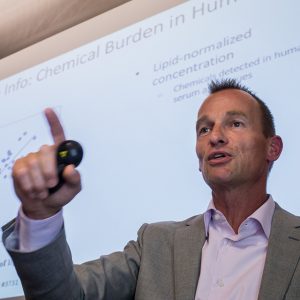 A little-known fact about ASU – it is home to the National Sewage Sludge Repository, the largest archive of its kind in the country. Samples in the repository come from 200 wastewater treatment plants and represent 10 percent of the U.S. population.
Senior Sustainability Scientist Rolf Halden, director of the Biodesign Center for Environmental Security, explains that this collection serves as a window into public health and habits. For example, if wastewater sludge shows high concentrations of opioids, researchers could alert authorities to a previously undetected drug problem.
This potential to point out public health concerns becomes increasingly relevant. As the world's population continues to move to cities, the ability to diagnose human activities, consumption and health in urban centers will be key to understanding and managing human health and planetary sustainability.
A little-known fact about ASU – it is home to the National Sewage Sludge Repository, the largest archive of its kind in the country. Samples in the repository come from 200 wastewater treatment plants and represent 10 percent of the U.S. population.
Senior Sustainability Scientist Rolf Halden, director of the Biodesign Center for Environmental Security, explains that this collection serves as a window into public health and habits. For example, if wastewater sludge shows high concentrations of opioids, researchers could alert authorities to a previously undetected drug problem.
This potential to point out public health concerns becomes increasingly relevant. As the world's population continues to move to cities, the ability to diagnose human activities, consumption and health in urban centers will be key to understanding and managing human health and planetary sustainability.How collecting human waste supports planetary sustainability
 A little-known fact about ASU – it is home to the National Sewage Sludge Repository, the largest archive of its kind in the country. Samples in the repository come from 200 wastewater treatment plants and represent 10 percent of the U.S. population.
Senior Sustainability Scientist Rolf Halden, director of the Biodesign Center for Environmental Security, explains that this collection serves as a window into public health and habits. For example, if wastewater sludge shows high concentrations of opioids, researchers could alert authorities to a previously undetected drug problem.
This potential to point out public health concerns becomes increasingly relevant. As the world's population continues to move to cities, the ability to diagnose human activities, consumption and health in urban centers will be key to understanding and managing human health and planetary sustainability.
A little-known fact about ASU – it is home to the National Sewage Sludge Repository, the largest archive of its kind in the country. Samples in the repository come from 200 wastewater treatment plants and represent 10 percent of the U.S. population.
Senior Sustainability Scientist Rolf Halden, director of the Biodesign Center for Environmental Security, explains that this collection serves as a window into public health and habits. For example, if wastewater sludge shows high concentrations of opioids, researchers could alert authorities to a previously undetected drug problem.
This potential to point out public health concerns becomes increasingly relevant. As the world's population continues to move to cities, the ability to diagnose human activities, consumption and health in urban centers will be key to understanding and managing human health and planetary sustainability.